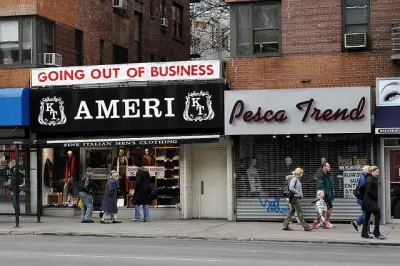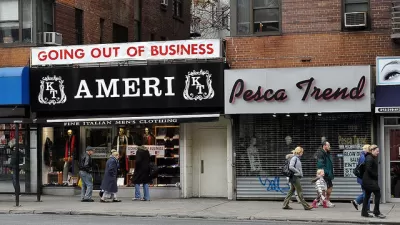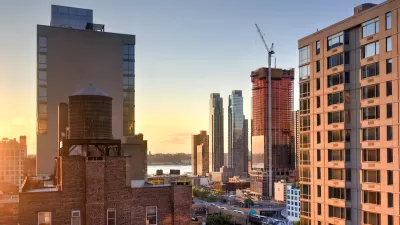Why are so many shops closing in New York's richest and best-known neighborhoods?

Tim Wu reports on a counter-intuitive "surge of closings and shuttered shops" in New York's West Village and other affluent neighborhoods with unparalleled demand.
"Abandoned storefronts have long been a hallmark of economic depression and high crime rates, but the West Village doesn’t have either of those. Instead, what it has are extremely high commercial rents, which cause an effect that is not dissimilar. 'High-rent blight' happens when rising property values, usually understood as a sign of prosperity, start to inflict damage on the city economics that Jane Jacobs wrote about."
Wu goes on to list some of the closings that have occurred in the neighborhood—and the rising rents that preceded the loss of the businesses. As for why the vacant units don't immediately get filled by new tenants, Wu speculates that it could be tax benefits, but it could also be a form speculation:
"[Landlords will] trade a short-term loss for the chance eventually to land a much richer tenant, like a bank branch or national retail chain, which might pay a different magnitude of rent. If you’re a landlord, why would you keep renting to a local café or restaurant at five thousand or ten thousand dollars a month when you might get twenty thousand or even forty thousand dollars a month from Chase?"
Wu allows that leaving the blight of vacant retail properties threatens to destroy what makes such neighborhoods so desirable in the first place.
As for what can be done to imitigate the problem, Wu mentions two regulatory proposals with support from local advocates. One would "limit rent spikes by making commercial-lease-renewal disputes subject to mandatory mediation and arbitration, like some baseball salaries." The other would fine landlords for leaving storefronts empty. Wu also mentions the possibility of allowing interim uses in the storefronts.
FULL STORY: Why Are There So Many Shuttered Storefronts in the West Village?

Planetizen Federal Action Tracker
A weekly monitor of how Trump’s orders and actions are impacting planners and planning in America.

Maui's Vacation Rental Debate Turns Ugly
Verbal attacks, misinformation campaigns and fistfights plague a high-stakes debate to convert thousands of vacation rentals into long-term housing.

San Francisco Suspends Traffic Calming Amidst Record Deaths
Citing “a challenging fiscal landscape,” the city will cease the program on the heels of 42 traffic deaths, including 24 pedestrians.

Defunct Pittsburgh Power Plant to Become Residential Tower
A decommissioned steam heat plant will be redeveloped into almost 100 affordable housing units.

Trump Prompts Restructuring of Transportation Research Board in “Unprecedented Overreach”
The TRB has eliminated more than half of its committees including those focused on climate, equity, and cities.

Amtrak Rolls Out New Orleans to Alabama “Mardi Gras” Train
The new service will operate morning and evening departures between Mobile and New Orleans.
Urban Design for Planners 1: Software Tools
This six-course series explores essential urban design concepts using open source software and equips planners with the tools they need to participate fully in the urban design process.
Planning for Universal Design
Learn the tools for implementing Universal Design in planning regulations.
Heyer Gruel & Associates PA
JM Goldson LLC
Custer County Colorado
City of Camden Redevelopment Agency
City of Astoria
Transportation Research & Education Center (TREC) at Portland State University
Jefferson Parish Government
Camden Redevelopment Agency
City of Claremont





























